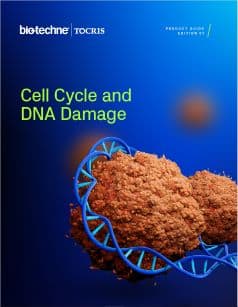Polo-like Kinase
Polo-like kinases (PLKs) are a family of four serine/threonine protein kinases that are critical regulators of cell cycle progression, mitosis, cytokinesis, and the DNA damage response. PLK1, -2 and -3 are ubiquitously expressed, whereas PLK4 is restricted to a few tissues.
Polo-like Kinase Inhibitors |
|
|---|---|
| Cat. No. | 产品名称/活性 |
| 5687 | Centrinone |
| High affinity and selective PLK4 inhibitor | |
| 5690 | Centrinone B |
| High affinity and selective PLK4 inhibitor | |
| 2977 | GW 843682X |
| Selective inhibitor of PLK1 and PLK3 | |
| 5403 | TAK 960 hydrochloride |
| Potent and selective PLK1 inhibitor | |
| 4459 | TC-S 7005 |
| Potent and selective PLK2 inhibitor | |
| 1232 | Wortmannin |
| Potent inhibitor of PLK1. Also inhibitor of PI 3-kinase | |
Polo-like kinases (PLKs) are a family of four serine/threonine protein kinases that are critical regulators of cell cycle progression, mitosis, cytokinesis, and the DNA damage response. PLK1, -2 and -3 are ubiquitously expressed, whereas PLK4 is restricted to a few tissues including the testes and the thymus.
The mRNA and protein expression of PLK1, -2 and -4 are coordinately regulated during cell cycle progression, but PLK3 levels are independent of the other three family members. Furthermore, PLK3 is a much more stable protein than PLK1, -2 or -4. PLK1 is the most well characterized member of this family and strongly promotes the progression of cells through mitosis. During the various stages of mitosis PLK1 localizes to the centrosomes, kinetochores and central spindle.
PLKs are dysregulated in a variety of human cancers. PLK1 overexpression correlates with cellular proliferation and poor prognosis. PLK2 and PLK3 are involved in checkpoint-mediated cell cycle arrest to ensure genetic stability. Loss-of-function mutations in these enzymes can lead to oncogenic transformation.
External sources of pharmacological information for Polo-like Kinase :
Literature for Polo-like Kinase
Tocris offers the following scientific literature for Polo-like Kinase to showcase our products. We invite you to request* your copy today!
*Please note that Tocris will only send literature to established scientific business / institute addresses.
Cell Cycle and DNA Damage Research Product Guide
This product guide provides a review of the cell cycle and DNA damage research area and lists over 150 products, including research tools for:
- Cell Cycle and Mitosis
- DNA Damage Repair
- Targeted Protein Degradation
- Ubiquitin Proteasome Pathway
- Chemotherapy Targets
Cell Cycle & DNA Damage Repair Poster
In normal cells, each stage of the cell cycle is tightly regulated, however in cancer cells many genes and proteins that are involved in the regulation of the cell cycle are mutated or over expressed. This poster summarizes the stages of the cell cycle and DNA repair. It also highlights strategies for enhancing replicative stress in cancer cells to force mitotic catastrophe and cell death.
Polo-like Kinase Gene Data
| Gene | Species | Gene Symbol | Gene Accession No. | Protein Accession No. |
|---|---|---|---|---|
| PLK1 | Human | PLK1 | NM_005030 | P53350 |
| Mouse | Plk1 | NM_011121 | Q07832 | |
| Rat | Plk1 | NM_017100 | Q62673 | |
| PLK2 | Human | PLK2 | NM_006622 | Q9NYY3 |
| Mouse | Plk2 | NM_152804 | P53351 | |
| Rat | Plk2 | NM_031821 | Q9R012 | |
| PLK3 | Human | PLK3 | NM_004073 | Q9H4B4 |
| Mouse | Plk3 | NM_013807 | Q60806 | |
| Rat | Plk3 | U02889 | Q62602 | |
| PLK4 | Human | PLK4 | NM_014264 | O00444 |
| Mouse | Plk4 | NM_011495 | Q64702 | |
| Rat | Plk4 | NM_001107669 | NP_001101139 |

